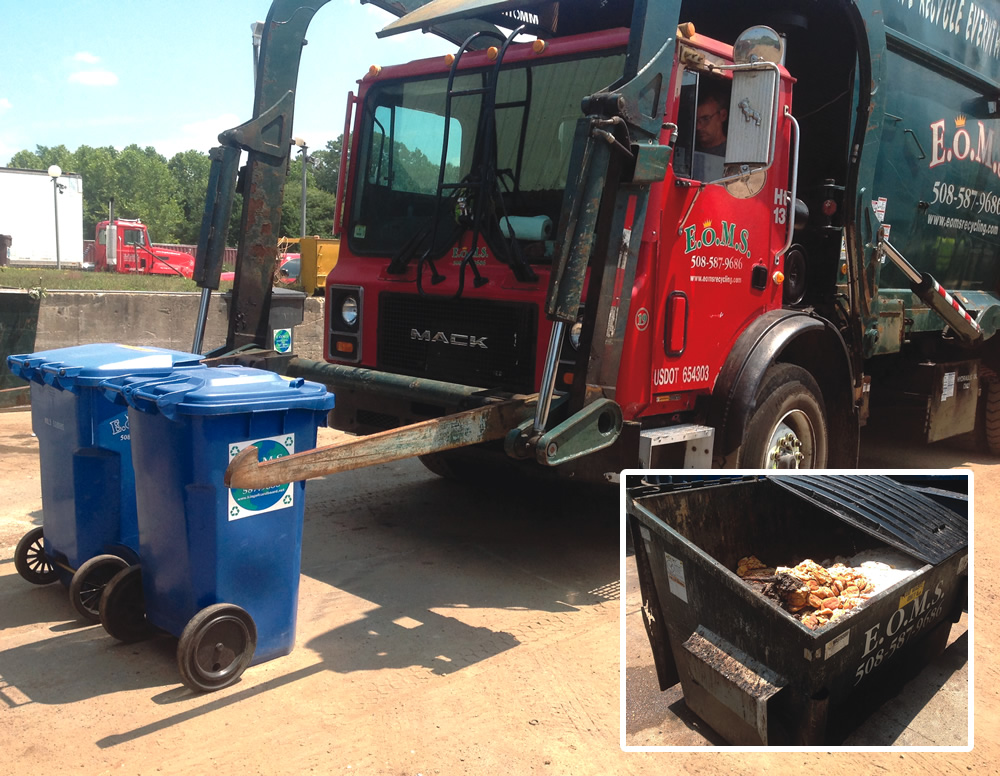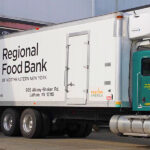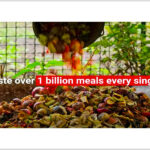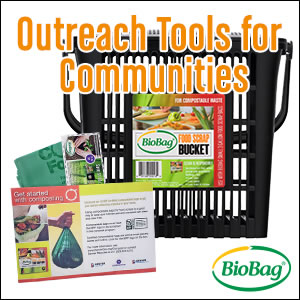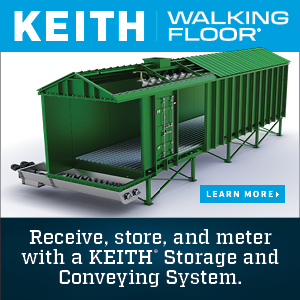Interviews with haulers yield valuable insights into how to successfully set up and run dedicated organics collection routes.
Nora Goldstein
BioCycle September 2014
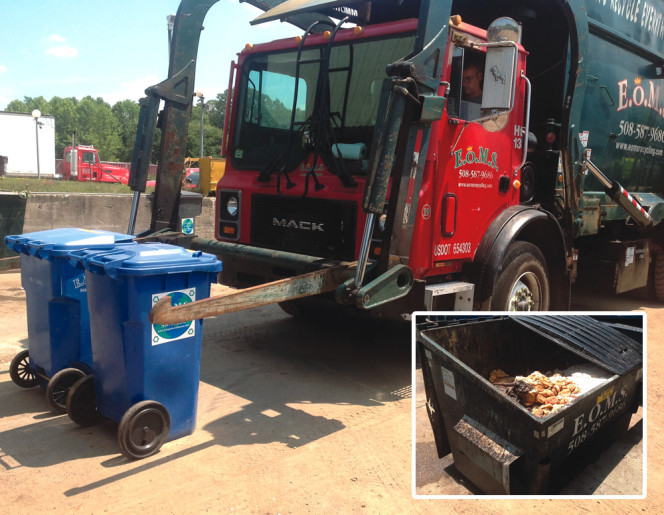
E.O.M.S. has over 300 food waste collection accounts. Customers use 64-gallon carts and/or 2- and 4-cubic yard containers (inset).
On October 1, the Commonwealth of Massachusetts’ ban on landfill disposal of commercial organics from establishments generating one ton or more of food waste per week goes into effect. On the front lines of helping these businesses and institutions comply are organics haulers, many of whom have been offering their services for years. “Seven years ago, we were servicing about two dozen customers with organics collection,” notes Andy Marhoffer of E.O.M.S. Recycling in West Bridgewater, Massachusetts. “Then about three years ago, this division of our trash and recycling collection company started taking off. Today, we have over 300 food waste collection accounts. And with the disposal ban going into effect on October 1, our phone has been ringing off the hook.”
In Charleston County, South Carolina, Food Waste Disposal, LLC has been experiencing similar growth, but not due to a disposal ban. “The idea of composting food and organic waste on a commercial scale was new to many businesses here when we started our collection service in 2012,” recalls Wayne Koeckeritz, owner of Food Waste Disposal. “Early adopters were the first to come on board. Today, we have close to 100 locations that we service.”
To gain insight on a variety of factors critical to collection of source separated commercial organics, BioCycle interviewed haulers in Massachusetts, South Carolina and Virginia. Questions focused on containers, route density, distance to processors and the collection vehicles.
E.O.M.S.
When BioCycle profiled E.O.M.S. Recycling in the August 2007 issue (“Planet Police Routes Out The Heavy Organics”), founder Louis Tarentino explained that the company began food waste collection as an add-on to its recycling services — primarily to lower customers’ trash disposal fees. “The restaurants were saying that their trash rates were outrageous, and a lot higher than that of the retail store next door,” said Tarentino. “They were questioning why they were paying so much more.” He explained to his customers that trash haulers use a formula to set their fees, which is based in part on what industry the business is in, and the average weights for that type of business. That formula uses heavier weights for restaurants than for retail stores or offices. “It sounded to me like there was a need for a food waste collection service,” he noted.
E.O.M.S. Recycling rolled out its food waste collection program in February 2007, forming a subsidiary called Planet Police. (That name is no longer used.) It initially targeted existing bakery and food manufacturing customers, providing either front load dumpsters in two, four and six cubic yard (cy) sizes, or 2-wheeled 64-gallon totes. E.O.M.S. purchased a Peterbuilt side loader truck to service the route. “Today, our clients include colleges, private and public schools, cafeterias at large corporations and institutions, restaurants and independent and chain grocery stores,” notes Marhoffer, a sales manager. “We focused on downtown Boston to build route density, and then have been moving out to the suburbs as well. Collection service is offered five days a week.”
The company collects both pre and postconsumer food waste, with and without compostable products. Not all of the composting facilities it uses accept compostable products. When feasible, E.O.M.S. will create a route for food waste with compostables, directing those loads accordingly. “For example, some of the colleges and private schools are doing all back of the house and front of the house food waste, and putting everything, including compostable products, in one container,” explains Marhoffer. “We make sure the truck servicing that route is going to a facility that accepts compostable products.”
One lesson learned from the earlier years of collecting food waste is to try to avoid use of 6-cy containers, as well as 96-gallon wheeled totes. “Those just get too heavy,” he adds. “Most of the supermarkets we service are using 2-cy or 4-cy containers; a few use compactors. While we make recommendations to our clients with regards to space considerations, we leave it up to them to choose. Some larger generators prefer totes versus the 2- or 4-cy containers because they can wheel them into the cafeteria or supermarket to fill. We do sell compostable BioBags to customers to line their totes. The price has really come down since we first started, as has the price of the serviceware.” E.O.M.S. does not offer a cart washing service. Customers are responsible for maintaining the totes.
Both rear load and front load Mack trucks are used for food waste collection. While the front-loading trucks also service the recycling routes, the rear load trucks are strictly used for food waste, says Marhoffer. “Those are custom-made for that purpose. They are completely sealed. There is so much weight on these vehicles, and they are on the road 12 to 14 hours a day. Given that wear and tear, we do a fair amount of preventive maintenance — and we go through tires more than other trucks in our fleet.”
Compliance with the Massachusetts commercial organics disposal ban will be monitored and enforced at solid waste facilities. The Massachusetts Department of Environmental Protection (MADEP) and RecycleWorks, its outreach and education contractor, have been actively working with generators to set up source separation programs. “We have been fielding a lot of phone calls and questions,” notes Marhoffer, “and we anticipate getting calls from inspectors about loads arriving at transfer stations and landfills that contain a lot of food waste. We expect we will be getting more customers soon.”
Save That Stuff
Founded in 1990 as a bootstrap collection company for recyclables, Save That Stuff (STS) has grown into a full-service provider of recycling, trash and organics collection services. Based in Charlestown, Massachusetts, STS jumped into commercial organics collection in 2006 as part of a new program launched by the City of Cambridge. It purchased a 25-cy McNeilus packer truck to collect the organics and brought the materials to a composting facility about 10 miles from the city. “We knew that we had some loading dock stops that would work better with a packer, and we also wanted to be able to see what goes into the truck,” said Adam Mitchell, a cofounder of STS in an August 2007 BioCycle article (“Partnerships Move Commercial Organics Forward”). “We also wanted to make sure that we had back up vehicles in case there were problems with the organics collection truck. STS had six other packer trucks with cart tippers that we could use.”
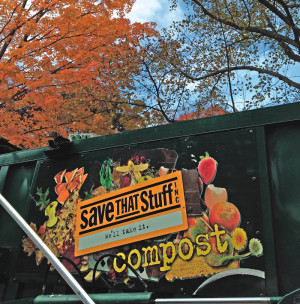
Save That Stuff collects about 8,000 tons/year of source separated food waste, running trucks six days a week. Photo courtesy of Save That Stuff
Fast forward to today, and STS is now collecting about 8,000 tons/year of commercial food waste, running trucks six days a week. “We have two rear loader trucks dedicated to food waste, along with compactors,” notes Mitchell. “We use 32-gallon Brute barrels, 64-gallon carts and 2-cy and 4-cy containers — with 4-cy being the max. Our service area goes from Boston and nearby cities to 25 miles west on the Massachusetts Turnpike and 25 miles north. The furthest distance we travel to a composting facility is the WeCare site in Marlborough, Massachusetts. Otherwise, we use farm-based composters that aren’t as far.” He adds that material collected on the “dirty route”— where there is less ability to control contaminants at the source — typically goes to WeCare, as that facility is designed to handle contaminants. The “clean route” materials are diverted to several farm-based composting facilities.
Recently, STS has been working with Waste Management to collect and slurry commercial organics, and then divert the material to the Massachusetts Water Resources Authority’s (MWRA) Deer Island Wastewater Treatment Plant for codigestion. Originally, the material was going to be transported by truck to Deer Island, but neighborhood concerns about increased truck traffic put the project on hold. The plan under consideration is to move the food waste by barge to Deer Island. “Things are on hold while MWRA and the MADEP work out financial details related to the necessary pier infrastructure,” says Mitchell. “Save That Stuff and Waste Management plan to build a receiving building (around 10,000 sq. ft.) on our property in Charlestown. We will cobrand our organics processing services.”
New England Solid Waste Consultants
New England Solid Waste Consultants (NESWC), based in Rowley, Massachusetts, began offering source separated organics collection in 2006, building on its existing construction and demolition debris and manure hauling services. “We have a total of 60 stops on our organics collection route,” says Wayne Ferreira, co-owner of NESWC. “Six of those are supermarkets, and most of the others are schools and colleges. We offer collection in eastern Massachusetts, and southern Maine and New Hampshire. While we primarily collect commercial organics, we are the the first company in Massachusetts to start collecting residential organics, which helped the communities of Hamilton-Wenham and Ipswich to begin residential curbside food waste collection and composting.”
The company’s motto when it comes to organics collection is to “keep it simple,” he adds. NESWC uses only 64-gallon wheeled carts, for example. It owns four modified rendering trucks made by Martel Welding; three are 40-cy bodies and one is a 30-cy body. “We roll the carts right onto the lift and can put in three at once,” notes Ferreira. “Our goal is to keep everything as simple as possible for everyone, including the trucks we use. Every other week, the trucks are brought in and greased. Every six weeks the oil is changed. Currently we rotate tires every six months, and replace all tires once per year.”
The 64-gallon wheeled toters are lined with disposable bags to contain odor and prevent spillage. NESWC offers food waste collection either once or twice a week as needed. Source separated organics are brought to five area composting facilities. “Our drivers are working up to nine hours a day,” he adds. “We are doing approximately 230 to 250 miles/day/truck.”
Ferreira says NESWC is prepared for the Massachusetts’ commercial organics ban to take effect. “We have an inventory here, including an extra truck. We decided we will stay within our current service area, which already is three-quarters of Massachusetts, and the other areas that we cover. If we have to add more trucks, we will. Just like everything else, we are going to keep it simple.”
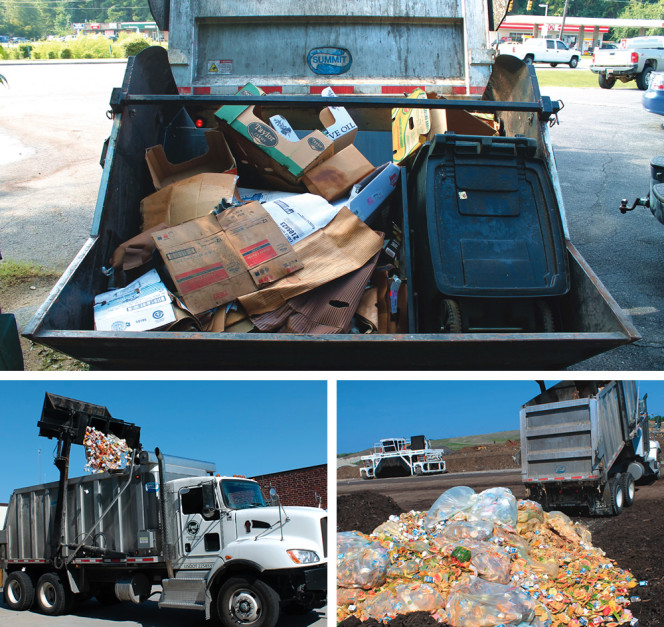
Hinged dividers in the bucket can be folded back to accommodate loads of waxed corrugated (top). Food Waste Disposal leases a Kenworth truck with a Summit food waste body (left). All food waste collected is composted at Charleston County’s (SC) Bee’s Ferry Compost Facility (right). Photos courtesy of Food Waste Disposal, LLC
Food Waste Disposal, LLC
Prior to launching Food Waste Disposal, LLC in March 2012 in Johns Island, South Carolina, Wayne Koeckeritz had worked for 14 years as a facility manager in luxury hotels where he oversaw solid waste disposal and recycling programs. “I saw the tremendous amount of food waste generated by those operations,” he notes. “However, there weren’t any viable options to deal with this waste until Charleston County, where I am located, started a food waste composting pilot program in 2011 at its yard trimmings facility. So, with my background in operations, a passion for sustainability and the opportunity to start a business hauling commercial and institutional food waste, I took the plunge.”
Koeckeritz started as a one-person operation with a used 25-cy rear loader equipped with a cart tipper. Customers included five supermarkets in the county, a university, restaurants, public schools, hotels, a manufacturing facility and hospitals. The first year (2012), 433 tons of food waste were collected.
Charleston County’s Bee’s Ferry Compost Facility, located next to the county’s landfill, was officially permitted in June 2012 to receive pre and postconsumer food waste. It also accepts compostable liners and products, which has facilitated Food Waste Disposal’s organics collection program. “We use 64-gallon wheeled carts lined with EcoSafe compostable liners,” explains Koeckeritz. “The liners provide a psychological benefit to customers expecting to see a liner in the bin they are using. And they do keep the residuals contained. I decided right from the start I was not going to offer a cart washing service because it is time consuming and slows down collection, so if customers don’t want to use the liners, they are responsible for keeping the carts clean. But it’s necessary to use rubber bands to keep the liners in place.” Food Waste Disposal owns the carts.
Based on the composition of the material he was collecting, Koeckeritz became concerned about the liability of using a standard packer truck in terms of spillage and leaking. He wanted a more suitable truck, but had started the company on a shoestring, raising just enough money to buy the rear loader. “By coincidence, in early 2013, I received a cold call from a local leasing company,” recalls Koeckeritz. “We got together and I explained the growth potential of my business, and ended up being able to lease a Kenworth truck with a Summit food waste body. I started using it in September 2013 and it has been an amazing transition. We have to make fewer trips to Bee’s Ferry given the greater capacity and the liquid-tight truck body. With the lease, preventive maintenance and any major repairs are covered. I am responsible for the tires and anything related to the hydraulics.
“The downside of the lease of course is it is more expensive than if I was able to outright buy the truck. When I was looking around to buy a new truck, however, no banks or lending institutions were willing to help with the financing. My only option was to lease. It was a tradeoff, but a tradeoff I don’t mind.”
The bucket on the truck is divided into three compartments to lift three 64-gallon totes at one time. Koec-keritz also collects waxed corrugated, which is accepted at Bee’s Ferry. To load the corrugated into the truck, the hinged dividers in the bucket are folded back to create a large single bucket. Koeckeritz has found the bucket also can be used to collect food waste not placed in the roll carts. “We have a produce wholesaler who occasionally receives a bad batch of zucchini or tomatoes. They may set the material out in 50-gallon drums or in boxes. We lower the bucket to the ground, setting it down at a ‘V’ shaped angle, and then tip the drums to empty them or hand load the boxes of product. ”
Food Waste Disposal, LLC has grown steadily. The company collects food waste from almost 100 locations, servicing nearly 400 carts. It runs two routes, six days a week (Monday-Wednesday-Friday route and Tuesday-Thursday-Saturday route). “By running two routes, we can cover two distinct geographical areas,” explains Koeckeritz. “It’s more miles and more wear and tear on the truck, but we are working to build route density and grow the company. In some cases, we have brought on an ‘outlier,’ e.g., a supermarket that we want as a client, and then we start to fill in from that furthest distance with new customers.” He adds that in 2013, a total of 1,930 tons were collected; through August 2014, nearly 1,500 tons were collected, making it likely the company will surpass last year’s total diversion.
Koeckeritz notes he is fortunate to have a county owned and operated composting facility available for the food waste collected. “Bee’s Ferry is my only option, and we are bringing in 90 to 95 percent of the food waste currently composted there,” he says. “The county’s goal is not profit motivated. It is to divert and recycle as much waste as possible.” The tipping fee was $25/ton when Food Waste Disposal started. The county created a tiered fee scale, with the fee decreasing as the volume brought in increases. In 2013, the company was paying $20/ton to tip at Bee’s Ferry. (By comparison, the tip fee at the landfill is $66/ton.) The tipping fees are Food Waste Disposal’s single largest expense.
The company turned the corner in 2013, and is now running in the black. It services 10 of the 12 Publix supermarkets in the area, all but one or two hospitals and a growing number of public schools (see “Food Scraps Diversion Goes To School,” May 2014). Koeckeritz has been able to supplement revenues from collection by becoming a distributor for EcoProducts, a compostable products company. “It’s been a great addition to the company,” he explains. “Many organics haulers are also the composters, so they have that additional revenue stream. I needed to supplement our revenue, and EcoProducts has so many varieties of compostable products that meet my existing clients’ needs. It also opens doors to potential new food waste generators that we can service.”
This fall, Food Waste Disposal will be adding 18 new schools, bringing the total of Charleston County public schools serviced to 50. The company also is doing a pilot with another grocery chain. “We definitely need another truck, but we don’t have quite enough revenue right now to add another truck like we have,” notes Koeckeritz. “So we are getting a large flatbed truck with a lift gate. We will collect full carts, switching them with empty ones. The flatbed will be a feeder to our main truck, meeting up with it and unloading the carts. This is a bridge until we generate enough revenue to support another food waste truck.”
Heading into his third year in business, Koec-keritz reflects on his journey as a food waste collection entrepreneur (see sidebar for additional lessons learned). “It has been an exceptional amount of physical, hard grinding work, six days a week. I have never questioned whether it would be successful or not. I am just continually thinking about how to grow the company, and manage it better. This has been a great career change … this is the best thing I have ever done.”
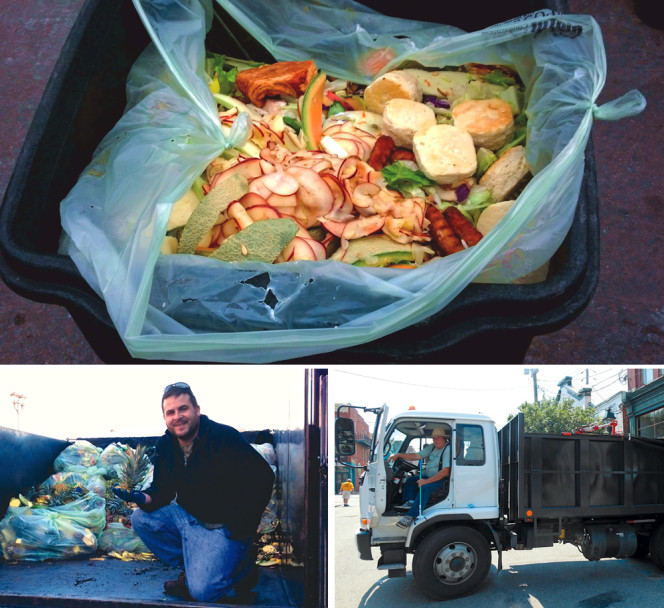
Natural Organic Process Enterprises places compostable liners in the 48-gallon totes (top). Modified dump bed trucks with a heavy-duty vinyl liner in the beds (with Marshall Hall, left) are used to collect food waste (Chip Hall at wheel, right). Photos courtesy of N.O.P.E.
Natural Organic Process Enterprises
Natural Organic Process Enterprises (N.O.P.E.) in Richmond, Virginia was founded in 2009 by C.V. “Chip” Hall, who had worked for more than 25 years selling solid waste collection and recycling equipment. “Over the years, I would encounter people who were involved in organics recycling, but it wasn’t until I went out on my own that I had a chance to explore that,” he explains. “One day, I was driving out to visit a composting facility about two hours away from Richmond, which takes me right past a business that sells used trucks. I stopped, and ended up purchasing a dump bed truck in my price range.”
With a truck in hand, Hall and his son Marshall launched their food waste collection enterprise. The first client was a local university, and then N.O.P.E. expanded into the hospital market. “The university was so enthusiastic and willing to source separate its food scraps, as were the hospitals,” recalls Hall. “It became obvious that socially-minded businesses and institutions were very pro recycling and interested in diverting their organic waste.”
Today, N.O.P.E. services about 40 commercial and institutional generators in eastern and central Virginia. Most of the organics collected are taken to McGill Compost’s Waverly, Virginia facility that is permitted to take all types of organic waste, as well as compostable products. Preconsumer vegetative organics collected in the Richmond area can be tipped at a small composting operation closer by. Customers are offered multiple size totes. “Early on, it became clear to us that for our operation, it is important to use a small batch collection method,” says Hall. “We started with 48-gallon totes that when filled, weigh close to 200 lbs. For establishments using compostable service ware, we provide 96-gallon totes for that material, because it is lighter.” Customers use compostable liners in the food waste carts.
To prevent leakage, the steel bed of the original truck was sealed by inserting a heavy duty vinyl liner and using rubber sealant. The company now has three dump bed trucks in service, each one modified a bit differently to service various types of generators. “For example, if we are doing events, we need a truck that can carry carts and containers,” he adds. “And we use both manual and hydraulic-powered cart lifts.”
To “fight the battle” of contamination, N.O.P.E. has a clause in its contracts that allows the company to add a fee if it has to remove contaminants from the source separated organics. When contaminated loads are encountered, the driver takes a digital photo, which is sent to the manager on site that day. “We want them to be aware of the problem and address it, and we want to give them a heads up that if their bill is higher, it was due to contamination,” explains Hall. “This has been working pretty well.” Drivers try to remove contamination before heading to the next stop on their route.
Most customers are serviced a minimum of once weekly with some receiving collection two to three times a week based on their generation rate. With landfill tip fees in Virginia in the $20 to $30/ton range, the company endeavors to stay competitive with its fees. “When you add in the cost of the cart liners and the auxiliary supplies, it can be slightly higher than what the generators are paying for trash collection,” he notes. “When we formed this company, we wanted to work with people who are interested in having this service and understand our goals. I believe we have achieved that.”
Recently, Marshall Hall initiated a compost credit program, working in tandem with McGill Compost’s “Lock the Loop” program. “Every time we collect from a customer, they are credited back 40 lbs or 1 cubic foot of compost,” adds Hall. “Many of the clients we pick up food waste from are also compost customers of McGill, using the material for landscaping and flower and garden beds. Reflecting back over the last five years, we are very gratified that we are meeting our company’s goal of providing environmental ‘benefit’ through positive support of the organics recycling industry.”


